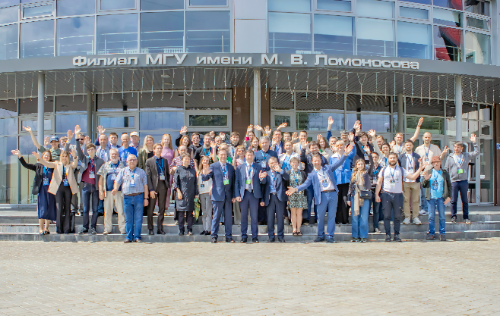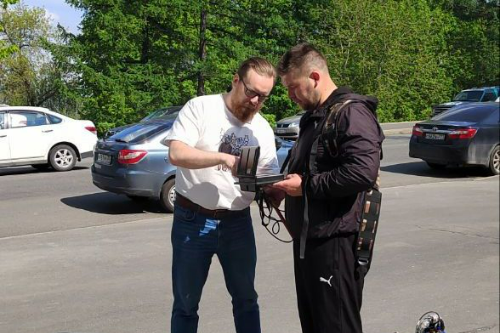The project “Wolf: Barents predators – managing large carnivores in the Barents region” will be implemented in 2021–2022 in collaboration with the Swedish-Karelian Business and Information Center. The aim is to create a Barents region network for the study and management of the carnivore’s populations based on exchange of expertise and research results.
The project was initiated by Swedish colleagues, as Head of the Zoology Laboratory (Institute of Biology KarRC RAS) Konstantin Tirronen told us.
– Wolves had been totally eradicated in Sweden in the past. They reappeared in the country in 1982. By then, national legislation protecting large carnivores has been enacted. Swedish wolf population today is comparable to that in Karelia – some 400 animals. Yet, the important question of the provenance of the wolves remained unanswered. The Swedish wolf population has been genetically monitored throughout its recent history. Last year, the international consortium, which included out team too, published a scientific article, which proves the affinity of Swedish wolves with the Karelian-Finnish wolf population.
Karelian researchers also have expertise to share with foreign partners: KarRC RAS has monitored large carnivore and ungulate populations since the 1960s.
According to the expert, the project will focus on aspects of setting up the system for genetic monitoring of the population. In addition, it will address interspecies relationships between carnivores, the role of wolves in ecosystems and their interactions with domestic animals, first of all dogs. Wolf attacks on dogs are a concern for people. Scientists, on the other hand, are also concerned with interspecies hybridization issues.
The core idea of the project is to set up genetic monitoring of the Karelian population to follow its status and adequately respond to emerging challenges. In Swedish, such monitoring has been underway for decades.
The project implementation started with an expedition to the Kalevalsky District, Republic of Karelia, as part of networking efforts. On March 18 to 28, Head of the Zoology Laboratory Konstantin Tirronen, Senior Research at the same laboratory Danila Panchenko, and Senior Researcher at the Kostomukshsky Strict Nature Reserve Yuri Krasovsky took part in fieldwork in Kalevalsky District and Kalevalsky National Park. The scientists gathered information regarding encounters and the distribution of home ranges of individual wolf packs.
During the expedition, non-invasive biological material and biological samples from wolves killed by hunters were collected. This material will be used in morphometric, parasitological, and physiological studies, and to investigate the genetic characteristics of the Karelian wolf population.
Other activities within the project include more fieldwork and research, workshops for discussing the results and working out the exchange algorithm. Further information about the project progress will be available from future publications and a research workshop this summer.
Photos by Danila Panchenko
International
News

April 30, 2021
A new international project entitled “Wolf: Barents predators – managing large carnivores in the Barents region” started at KarRC RAS. In the project, scientists from Karelia and Sweden will share expertise and research results regarding wolf populations.
See also:

July 10, 2025
International School “Interaction of Hydrogen Isotopes with Structural Materials” was held at the National Center for Physics and Mathematics in Sarov, Novgorod Region. Karelian scientists gave a lecture and presentations on computational materials science – an efficient tool for rescaling test-sample experimental data to real-life power reactor structures.

June 6, 2025
Study trip to KarRC RAS helps specialist from Vitebsk master new electrical resistivity imaging techniques, with applications in construction
Cooperation of Karelian Research Center RAS with Vitebsk State University continues. On June 5, the University's Master's student Dmitry Lysov completed his practical training course. The construction industry specialist studied the geophysical methods used by researchers at KarRC RAS.
Cooperation of Karelian Research Center RAS with Vitebsk State University continues. On June 5, the University's Master's student Dmitry Lysov completed his practical training course. The construction industry specialist studied the geophysical methods used by researchers at KarRC RAS.

June 5, 2025
Scientists from India and Russia lecture on mathematical modeling of communication systems at IAMR KarRC RAS
Institute of Applied Mathematical Research KarRC RAS is hosting a set of lectures of stochastic modeling of telecommunication systems. Scholars from the Indian Institute of Technology Delhi (IIT-Delhi) are appearing before young scientists from Russia and India as invited professors.
Institute of Applied Mathematical Research KarRC RAS is hosting a set of lectures of stochastic modeling of telecommunication systems. Scholars from the Indian Institute of Technology Delhi (IIT-Delhi) are appearing before young scientists from Russia and India as invited professors.





